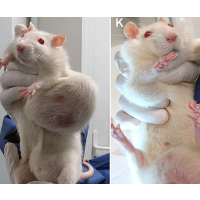Controversial GMO Report Highlights Dearth of Scientific Studies
 Rats with tumors after they were fed a diet of genetically modified corn produced by Monsanto (photo: AFP / Criigen)
Rats with tumors after they were fed a diet of genetically modified corn produced by Monsanto (photo: AFP / Criigen)
Less than two months before Californians vote on whether products using genetically-modified organisms (GMOs) should be labeled as such, a new French study has cast deep doubts about the safety of the products.
Peer-reviewed research by Caen University in France found that rats fed a lifelong diet of modified corn suffered breast tumors and liver and kidney damage. The study also looked at the world’s best-selling weed killer, Monsanto’s Roundup, which is often used in conjunction with the herbicide-resistant GMOs and found that rats exposed to even tiny amounts of the product suffered similar health problems.
“This research shows an extraordinary number of tumours developing earlier and more aggressively―particularly in female animals. I am shocked by the extreme negative health impacts,” according to Michael Antoniou, a King’s College London molecular biologist who helped draft the paper.
The findings were immediately attacked by outside scientists who questioned the study’s methodology, statistical analysis and reporting of results. One called it a “statistical fishing trip” and Mark Tester, a research professor at the Australian Centre for Plant Functional Genomics at the University of Adelaide, wondered why no previous studies have flagged similar concerns.
Scientists who worked on the study addressed Tester’s complaint directly, arguing that no one had actually done long-term studies of GMOs. Antoniou said the findings highlighted the “need to test all GM crops in two-year lifelong studies.” Genetic engineering has come under fire from critics for years or what they perceive is industry bias in scientific studies and the lack of long-term studies..
Until now, GMO crops have approved for public consumption after 90-day feeding trials, three months being the equivalent of late adolescence in rats. But rats can live for at least two years, and the French study took the longer view.
The scientific paper, which was published in the Food and Chemical Toxicology journal, concluded that the GMO product and Roundup caused damage to the rats whether or not they were consumed together. Researchers, led by University of Caen Professor Gilles-Eric Séralini, studied 10 groups of rats for two years, with each group containing 10 males and 10 females. The scientists said 50% of male and 70% of female rats died prematurely, compared with only 30% and 20% in the control group.
Europeans are much more skeptical of GMOs than Americans. They are banned in France, and the European Union and Japan already require that GMOs be labeled. In the United States, 95% of sugar beets are genetically engineered, as are 94% of soybeans and 88% of feed corn.
On November 6, Californians will vote on Proposition 37, one of 11 initiatives on the ballot. Monsanto and the biggest pesticide and biotechnology companies in the world have already poured $25 million into the campaign to defeat the measure. California would be the first state to require GMO labeling.
Prop. 37 would require labels on most processed food by 2014, identifying any ingredients from agricultural products with genetically altered DNA. Food and alcohol in restaurants would be exempt, as would food from animals that have been eating the modified ingredients.
–Ken Broder
To Learn More:
French Study Rocks GMO Labeling Debate (by Carolyn Lockhead, San Francisco Chronicle)
Monsanto Roundup Weedkiller and GM Maize Implicated in “Shocking” New Cancer Study (by Elinor Zuke, The Grocer)
Study on Monsanto GM Corn Concerns Draws Skepticism (by Ben Hirschler and Kate Kelland, Reuters)
Fresh Row over GM Foods as French Study Claims Rats Fed the Controversial Crops Suffered Tumours (Daily Mail)
Long Term Toxicity of a Roundup Herbicide and a Roundup-Tolerant
Genetically Modified Maize (Food and Chemical Toxicology) (pdf)
- Top Stories
- Controversies
- Where is the Money Going?
- California and the Nation
- Appointments and Resignations
- Unusual News
- Latest News
- California Forbids U.S. Immigration Agents from Pretending to be Police
- California Lawmakers Urged to Strip “Self-Dealing” Tax Board of Its Duties
- Big Oil’s Grip on California
- Santa Cruz Police See Homeland Security Betrayal in Use of Gang Roundup as Cover for Immigration Raid
- Oil Companies Face Deadline to Stop Polluting California Groundwater





